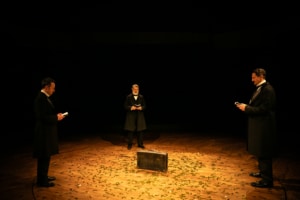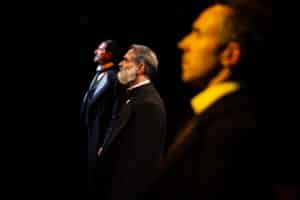DCPA NEWS CENTER
Enjoy the best stories and perspectives from the theatre world today.
Enjoy the best stories and perspectives from the theatre world today.
Two months into the pandemic, in May of 2020, I began reading Yuval Noah Harari’s Sapiens: A Brief History of Humankind. The book traces 70,000 years of human development, beginning with the dawn of modern cognition, to the development of nomadic societies, the advent of agriculture, to the building of ancient empires, and finally, inevitably, the creation of modern capitalism. The promised land.

Tasso Feldman as Mayer Lehman in The Lehman Trilogy. Photo by Jamie Kraus Photography
Capitalism, Harari posits, began as an economic theory, but quickly became an ethic – “a set of teachings about how people should behave, educate their children and even think. Its principal tenet is that economic growth is the supreme good…because justice, freedom and even happiness all depend on economic growth.”
Capitalism has become a religion. And the most expansive and successful one to date. Our temples and churches have been replaced by skyscrapers as the centers of our communities. Consumerism our daily prayers.
This same idea lives at the center of The Lehman Trilogy. This morality tale that follows the growth of American capitalism over 163 years of one family’s history. Three devoutly Jewish brothers arrive in America and set up shop, and with each successive generation the Lehman’s religious and cultural practices wane as the wealth of their company grows. One of the most important questions I think this play asks is: What is the spiritual cost of capitalism? What happens to the soul when our belief in an economic system replaces our belief in the divine? (In each other?)
Greed ultimately leads to the company’s destruction, and triggers a global financial crisis. This is a story of hubris of course — one that most of us lived through. (Yet another case of the majority suffering the consequences of crimes committed by an elite few.) But The Lehman Trilogy is also an immigrant story and an exploration of the seductive fantasy of the American Dream. It’s an examination of relationships between fathers and sons — what we inherit and what we reject. And for all the generations of Lehman men, this is a story of the struggle to stay relevant in an ever-changing world.
These men are inventive. They are imaginative and resourceful and relentlessly ambitious. All traits fueling the fire of their overwhelming success. And illustrating this sense of invention has been a key priority in designing our production. We found almost immediately when reading the script together, that it was impossible to analyze the text without first investigating the original production created by the National Theater in London. Unlike the majority of plays that are generated in the mind of a playwright as she writes alone at her desk, this piece was shaped through a devising process involving actors, designers, director and adaptor, and consequently, much of that original English production is woven into the DNA of the script, leaving us with the question: what from that production is essential to maintain, and what we can push against?

Tasso Feldman, Matthew Boston, and Sasha Roiz in The Lehman Trilogy. Photo by Jamie Kraus Photography
At its heart this is storytelling theater. And one of the main elements we felt it was important to preserve from the original is the idea that our actors are creating the 40 plus locations throughout the play using building blocks, with sound and light reinforcing these environments. Our actors play over 66 different characters over the course of the piece, and so our aim has been to create a playground of transformation for our masterful and athletic trio. We are using the tools of poor theater to tell a story of insatiable riches.
Our play ends where it begins in 2008. The Lehman Corporation fails and soon thereafter the Great Recession begins. In the years following the question of inequality and its enduring history became a hot topic for debate. Occupy Wall Street brought the critique of the 1% into the mainstream, yet 16 years later, the gap between the ultra-rich and the rest of us continues to grow. What has actually changed?
Reading Sapiens that spring of 2020 I felt a strange flicker of hope. For all of Harari’s learning, he didn’t predict a global pandemic. Maybe, in the face of this crisis, we’d finally reached a true turning point. A pause where we could collectively reconsider what was truly important and course correct. But soon, all of the companies who’d halted their advertising to send out messages of support for first responders and Black Lives Matter just began promoting their stuff again. And at first it felt tacky, and then…it just returned to being normal.

Matthew Boston (center), Sasha Roiz (left), and Tasso Feldman (right) in The Lehman Trilogy. Photo by Jamie Kraus Photography
We are conditioned consumers. What our grandparents considered luxuries have become our necessities. And, as we learn in The Lehman Trilogy, this is by design. Paul Mazur of the Lehman Brothers strategized “we must shift America from a needs, to a desires culture. People must be trained to desire, to want new things even before the old has been entirely consumed. We must shape a new mentality in America. Man’s desires must overshadow his needs.” His plan succeeded with flying colors and our society and planet are now paying the price.
It’s my great hope that our production urges people to ask: how am I part of the problem? How can I embrace when enough is enough? In what ways are we all complicit in the destructive forces of our economic system? And can we build a new way?
In The Dawn of Everything David Graeber offers an alternate telling of human development. One that challenges Harari’s idea that the path towards capitalism was an inevitable one. Graeber looks to highly developed Indigenous societies of the past, ones that were both sophisticated and egalitarian, to show us a road we may have gone down instead. He suggests that we took a wrong turn– and considering the current state of the world, that feels difficult to deny—but that human beings (sapiens) possess the imagination and intelligence to examine these models from the past and once again, reinvent ourselves.
DETAILS
The Lehman Trilogy
May 3-June 2, 2024 • Kilstrom Theatre
Tickets
